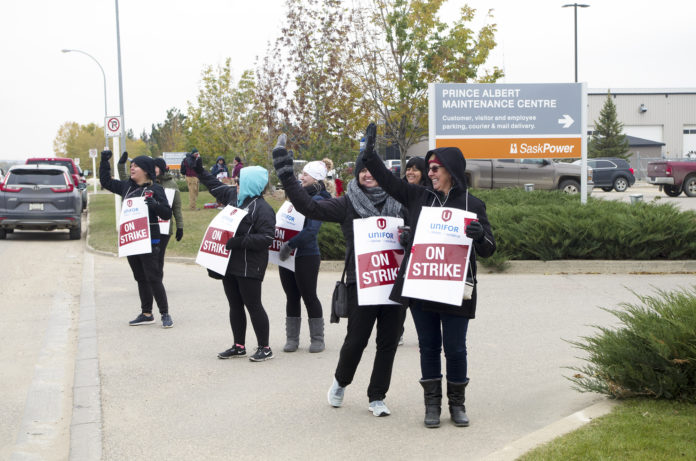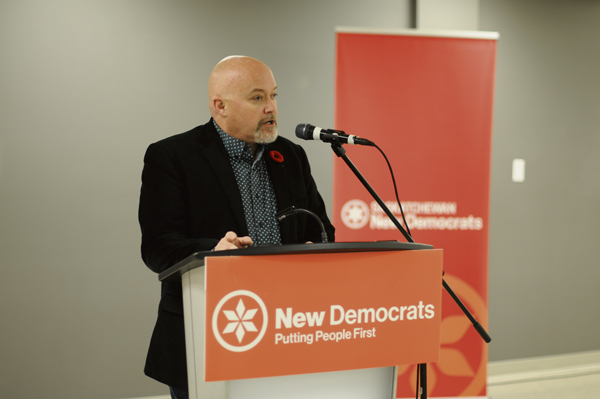
The remaining Saskatchewan Crown corporation employees represented by Unifor ratified their new contracts Friday.
Unifor announced Friday afternoon that employees at SaskTel, SaskEnergy, SaskPower and the Water Security Agency has joined SecureTek and DirectWest employees in ratifying the contracts that came out of the 17-day Crown strike this past October.
That strike saw about 5,000 Crown employees walk off the job, demanding a better contract. Protests shut down streets in Regina and blocked entry to facilities across the province.
“We are very pleased that Unifor represented employees have voted to ratify their respective agreements,” Finance Minister Donna Harpauer said in a press release. “We believe the agreements are fair and equitable and provide for long-term stability for both employees and Crown corporations and agencies. Thank you to both management and union bargaining teams for their hard work and dedication throughout the process.”
All of the ratified deals include zero per cent increases in the first two years of the agreement. They include one per cent increases in the third year of the agreement. SaskEnergy, SaskWater and SaskPower employees will receive two per cent increases in the fourth, fifth and sixth years of their contract.
Water Security Agency employees will receive a one per cent increase and a one per cent pension increase in the fourth year of their contract and two per cent increases in the fifth and sixth year of their contract.
SaskTel employees will receive two per cent increases in the fourth and fifth years of their contract.
Active full-time employees at SaskTel, SaskEnergy, SaskPower and SaskWater will receive four days’ pay and full-time employees who worked in essential positions during the strike will receive a pro-rated number of days pay.
The government characterized that payment as hardship pay for the labour disruption, while the union characterized it ats a lump sum payment representing a 1.6 per cent increase in compensation for the employees.
“All six crowns … received the equivalent of a 1.6 per cent lump sum payment, and there are other provisions in every one of the collective agreements that we believe provide benefits and improvements over and above the mandate the employer put on the table,” said Scott Doherty, executive assistant to Unifor national president Jerry Dias.
“Like we were saying all along, there are innovative ways to find ways to beat the mandate. We found those and our members overwhelmingly accepted that. We never said we would never accept the zeros. We said we would never accept the mandate and that we had to beat the mandate. In every one of the agreements, we believe we’ve beaten the mandate.”
Other victories, Doherty said, included SaskTel and SaskEnergy winning provisions that improved contracting out language and getting jobs back that were being contracted out.
“That’s something that wasn’t there in the past. There were other provisions throughout the agreement. They’re all so different that I don’t want to get into the details.”
Though he refused to elaborate, Doherty said improvements were made in every collective agreement.
Only one of the Crown corporations issued a media release Friday.
SaskWater sent out a press release outlining its ratified deal. That saw an amendment to bereavement leave so that employees can charge one additional day against their accrued sick leave credit. They also saw increases to the benefit of their wellness and health policy by $50 in 2020, 2021, 2022 and 2023.
That’s in line with what other crown corporations have seen. Both Directwest and SecureTek employees also saw their employer’s contributions to health or flex spending accounts increase in final deals.
While speaking at the NDP convention in Prince Albert on Nov. 3, Unifor local 1-S president Dave Kuntz, said that was one way the union broke through the alleged government mandate. Unifor 1-S represents SaskTel employees.

“Those two items together, just for SaskTel, resulted in $7 million in new money introduced into the collective agreement,” Kuntz said, “equivalent to about 3.6 per cent. All the other crowns had similar deals.”
Other victories, Kuntz said, included better language concerning contracting out and gains on mental health commitments and performance management.
Throughout the bargaining process, the provincial government denied there was a mandate to keep compensation at certain levels.
“No there is not a government mandate — as you can see, each table came back with a different deal,” the government said in an emailed response to questions.
“The government outlined a framework and that was adhered to. As we have stated all along, everyone bargained freely.”
But Kuntz, in his comments, refuted that assertion.
“We asked the chair across the table from us, do you have control of the financial package and the ability to say ‘yes’ to our tentative agreement, and she said ‘yes,” Kuntz said. “We knew she didn’t and shortly after that she found out she didn’t have control of that money.”
Strike ‘historic’
Doherty and Kuntz both agreed that the scale of the Crown strike in Saskatchewan was unlike anything ever seen.
“We haven’t been able to get all of the crowns lined up the way we were able to,” Doherty said Friday.
“All the groups …. Were all united in the fact that they weren’t prepared to leave anybody behind. That’s historic for us and it shows that Crown workers, in general, need to stick together and find a way to get past some of these austerity measures the government tries to put in place.”
“Overall, we accomplished our goals,” Kuntz said. “In the process, we were able to mobilize 5,000 members and show the benefits of strength, solidarity and standing together. We showed … the public and the government what Unifor is capable of doing.”
Doherty added that other corporations going up against Unifor should take notice, especially the Co-op refinery in Regina, where mediation attempts broke down earlier this week.
“Co-op refinery should take notice of the fact that Unifor was able to successfully push back on the government,” he said.
“I hope they would take notice with the impending labour dispute, that they would rethink their position and get back to the bargaining table.”

